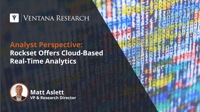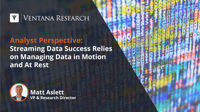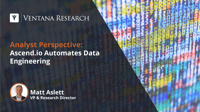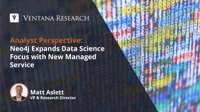I have written recently about increased demand for data-intensive applications infused with the results of analytic processes, such as personalization and artificial intelligence (AI)-driven recommendations. Almost one-quarter of respondents (22%) to Ventana Research’s Analytics and Data Benchmark Research are currently analyzing data in real time, with an additional 10% analyzing data every hour. There are multiple data platform approaches to delivering real-time data processing and analytics...
Read More
Topics:
Cloud Computing,
Data,
Streaming Analytics,
Analytics & Data,
Streaming Data & Events,
analytic data platforms,
operational data plaftforms
I recently noted that as demand for real-time interactive applications becomes more pervasive, the use of streaming data is becoming more mainstream. Streaming data and event processing has been part of the data landscape for many decades, but for much of that time, data streaming was a niche activity. Although adopted in industry segments with high-performance, real-time data processing and analytics requirements such as financial services and telecommunications, data streaming was far less...
Read More
Topics:
Big Data,
Data,
Streaming Analytics,
Analytics & Data,
Streaming Data & Events
I have recently written about the importance of healthy data pipelines to ensure data is integrated and processed in the sequence required to generate business intelligence, and the need for data pipelines to be agile in the context of real-time data processing requirements. Data engineers, who are responsible for monitoring, managing and maintaining data pipelines, are under increasing pressure to deliver high-performance and flexible data integration and processing pipelines that are capable...
Read More
Topics:
Big Data,
Cloud Computing,
Data Management,
Data,
data operations
I recently explained how emerging application requirements were expanding the range of use cases for NoSQL databases, increasing adoption based on the availability of enhanced functionality. These intelligent applications require a close relationship between operational data platforms and the output of data science and machine learning projects. This ensures that machine learning and predictive analytics initiatives are not only developed and trained based on the relationships inherent in...
Read More
Topics:
Business Intelligence,
Data,
AI & Machine Learning,
analytic data platforms,
Operational Data Platforms













